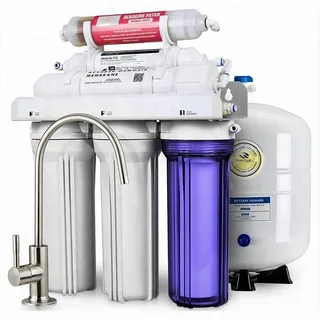Water is an essential element for our survival, but not all water is safe to drink. With increasing pollution and contamination, it has become more important than ever to ensure that the water we consume is clean and safe. This is where Water Filters come into play. These devices not only improve the taste and smell of water but also remove harmful chemicals and contaminants, making it safe for consumption. However, with so many options available in the market, choosing the right water filter can be a daunting task. In this blog post, we will discuss the importance of investing in a good water filter and how to choose the best one for your needs.
Understanding the Importance of Quality Drinking Water
Water is not just a thirst quencher; it plays a crucial role in maintaining our overall health and well-being. The human body is made up of around 60% water, and it is involved in various vital functions, such as regulating body temperature, transporting nutrients, flushing out toxins, and lubricating joints.
Drinking high-quality water is essential to ensure these processes work effectively. However, tap water can often contain impurities, contaminants, and chemicals that may be harmful to our health. These can include bacteria, viruses, heavy metals, pesticides, chlorine, and more.
This is where Water-Filters come in. They are designed to remove these impurities, ensuring that the water we drink is clean, pure, and safe. Investing in a good water filter can provide numerous benefits for our health.
- Firstly, it reduces the risk of waterborne diseases and illnesses caused by consuming contaminated water. By removing harmful substances, Water-Filters act as a barrier between us and potential health hazards.
- Secondly, filtered water can improve the taste, odor, and clarity of tap water. This makes it more enjoyable to drink and encourages proper hydration.
Analyzing Various Types of Water-Filters
When it comes to choosing a water filter, it’s important to understand that there are various types available in the market. Each type has its own unique features and advantages, so analyzing these options can help you make an informed decision.
One common type of water filter is the activated carbon filter. These filters are known for their ability to remove chlorine, bad tastes, and odors from water. They are also effective at reducing certain organic compounds and volatile organic compounds (VOCs). Activated carbon filters are often used in pitcher filters, countertop filters, and under-sink filters.
Another type of water filter is the reverse osmosis (RO) filter. These filters use a membrane to remove a wide range of contaminants, including bacteria, viruses, heavy metals, and dissolved solids. RO filters are considered one of the most effective types of Water-Filters, but they can be more expensive and require professional installation.
UV (ultraviolet) filters are also available and are particularly effective at killing bacteria and viruses. These filters use UV light to disinfect water, making it safe for consumption. However, they do not remove other contaminants, so they are often used in combination with other types of filters.
It’s also worth considering ceramic filters, which are made from porous ceramic material that traps sediment, bacteria, and other impurities. These filters are durable and easy to clean, but they may not be as effective at removing chemical contaminants.
Tips for Choosing the Water-Filter for Your Needs
When it comes to choosing the right water filter for your needs, there are several factors to consider. Here are some tips to help you make an informed decision:
- Understand your water quality: Before selecting a water filter, it’s important to know what contaminants are present in your water. You can do this by conducting a water test or contacting your local water utility. Once you have this information, you can choose a filter that specifically targets those contaminants.
- Consider your budget: Water-Filters come in a wide range of prices, so it’s important to set a budget before starting your search. Determine how much you’re willing to spend and look for filters that fall within your price range. Keep in mind that while some filters may have a higher upfront cost, they may offer better long-term value.
- Evaluate filter lifespan and maintenance: Different Water-Filters have varying lifespans and maintenance requirements. Some filters need to be replaced every few months, while others may last for several years. Consider how often you’re willing to perform maintenance tasks and factor that into your decision-making process.
- Check for certification: Look for Water-Filters that have been certified by reputable organizations, such as NSF International. Certification ensures that the filter has undergone rigorous testing and meets certain quality standards. This will give you peace of mind knowing that the filter is effective in removing contaminants.
- Consider installation and convenience: Some Water-Filters require professional installation, while others are designed for easy DIY installation. Consider your comfort level with installation and choose a filter that suits your needs. Additionally, think about the convenience of the filter. For example, if you prefer filtered water on the go, a pitcher or faucet-mounted filter may be a better choice than an under-sink filter.
Long-term Health Benefits of Using Water-Filters
Investing in a high-quality water filter offers numerous long-term health benefits that should not be overlooked. By ensuring that the water you and your family consume is clean and safe, you are taking a proactive step towards protecting your health.
- Firstly, using a water filter reduces the risk of waterborne diseases and illnesses caused by consuming contaminated water. Harmful substances such as bacteria, viruses, heavy metals, and pesticides are removed, acting as a barrier between you and potential health hazards. By eliminating these contaminants, you can have peace of mind knowing that the water you drink is safe and free from harmful substances.
- Secondly, using a water filter can lead to improved overall health. Clean, filtered water promotes better hydration, which is essential for the proper functioning of our bodies. Drinking enough water helps regulate body temperature, transport nutrients, flush out toxins, and lubricate joints. By ensuring that the water you drink is of high quality, you are supporting these vital bodily functions and promoting overall well-being.
Investing in a water filter can also have economic benefits. It eliminates the need for buying bottled water, which can be costly over time. By having a reliable water filter at home, you can save money while still enjoying clean and safe drinking water.
Realizing the Economic Value of Investing in a Water-Filter
When considering investing in a water filter, it’s important to realize the economic value it can bring to your life. While some may see the initial cost as a barrier, the long-term savings can far outweigh the expense.

By having a reliable water filter at home, you can eliminate the need for buying bottled water. Not only will this save you money, but it also reduces plastic waste and helps protect the environment. Bottled water costs can quickly add up, especially for families or individuals who rely on it as their primary source of drinking water.
In addition to saving money on bottled water, a water filter can also save you from the costs associated with water-related illnesses. Drinking contaminated water can lead to a range of health issues, from mild stomach upsets to more severe infections. By investing in a water filter, you can reduce your risk of falling ill and avoid the medical expenses that come with treating waterborne diseases.
Furthermore, using a water filter can also extend the lifespan of your appliances. Contaminants in tap water, such as heavy metals and minerals, can build up over time and cause damage to your plumbing system and appliances. By filtering out these impurities, you can prevent costly repairs or replacements down the line.
Common Water Contaminants and How Filters Help
Water is a vital resource for our survival, but unfortunately, it can often be contaminated with various harmful substances. Common water contaminants include bacteria, viruses, heavy metals, pesticides, chlorine, and volatile organic compounds (VOCs). These contaminants can pose serious health risks if consumed.
However, Water-Filters are designed to tackle these contaminants and provide clean, safe drinking water. Different types of filters target specific contaminants. For example, activated carbon filters are effective at removing chlorine, bad tastes, and odors. Reverse osmosis (RO) filters can eliminate a wide range of contaminants, including bacteria, viruses, heavy metals, and dissolved solids. UV filters, on the other hand, kill bacteria and viruses using ultraviolet light.
By investing in a water filter that is tailored to the specific contaminants in your water, you can ensure that you and your family are protected from potential health hazards. Water-Filters act as a barrier, removing these harmful substances and providing you with clean and safe drinking water.
Having a water filter also saves you from the cost of buying bottled water, which can be expensive in the long run. Additionally, using a water filter helps reduce plastic waste, contributing to environmental sustainability.
Prevent Illness and Stay Hydrated with the Best Water Filter
When it comes to our health, prevention is always better than cure. That’s why investing in the Best Water Filter is a smart choice to prevent illnesses and stay hydrated with clean and safe drinking water. By using a high-quality water filter, you can ensure that the water you consume is free from harmful contaminants and bacteria.
Water-Filters act as a barrier, removing impurities such as bacteria, viruses, heavy metals, and pesticides. This significantly reduces the risk of waterborne diseases and illnesses caused by consuming contaminated water. With a reliable water filter in place, you can have peace of mind knowing that you and your family are protected.
Additionally, drinking enough water is crucial for staying hydrated and maintaining overall health. Filtered water not only tastes better but also encourages proper hydration. When you have a water filter that provides clean and pure drinking water, you’re more likely to reach for a glass of water instead of sugary drinks or unhealthy alternatives.
FAQs
Q: How often should I replace my water filter?
A: The frequency of replacing your water filter depends on the type of filter you have and the quality of your water. Some filters may need to be replaced every few months, while others can last for several years. It is important to follow the manufacturer’s instructions and regularly check the filter’s lifespan.
Q: Are Water-Filters expensive?
A: The cost of Water-Filters varies depending on the type and brand. While some filters may have a higher upfront cost, they can provide better long-term value by eliminating the need for buying bottled water. It is important to set a budget and consider the long-term benefits when choosing a water filter.
Q: Do Water Filters remove fluoride?
A: Some Water-Filters can remove fluoride, but not all. If fluoride removal is important to you, look for filters specifically designed for that purpose or check the product specifications to ensure that it removes fluoride.
Q: Can I install a water filter myself?
A: The installation process varies depending on the type of water filter. Some filters are designed for easy DIY installation, while others may require professional installation. It is important to read the instructions provided by the manufacturer and determine your comfort level with installation before making a decision.
Conclusion
In conclusion, investing in a high-quality water filter is a smart decision for your health and overall well-being. By ensuring that the water you drink is clean and safe, you can reduce the risk of waterborne diseases and illnesses. Not only does a water filter improve the taste and odor of tap water, but it also encourages proper hydration. Additionally, using a water filter can save you money in the long run by eliminating the need for buying bottled water. So, don’t compromise on the quality of your drinking water – make a smart investment in your health with the right water filters.

